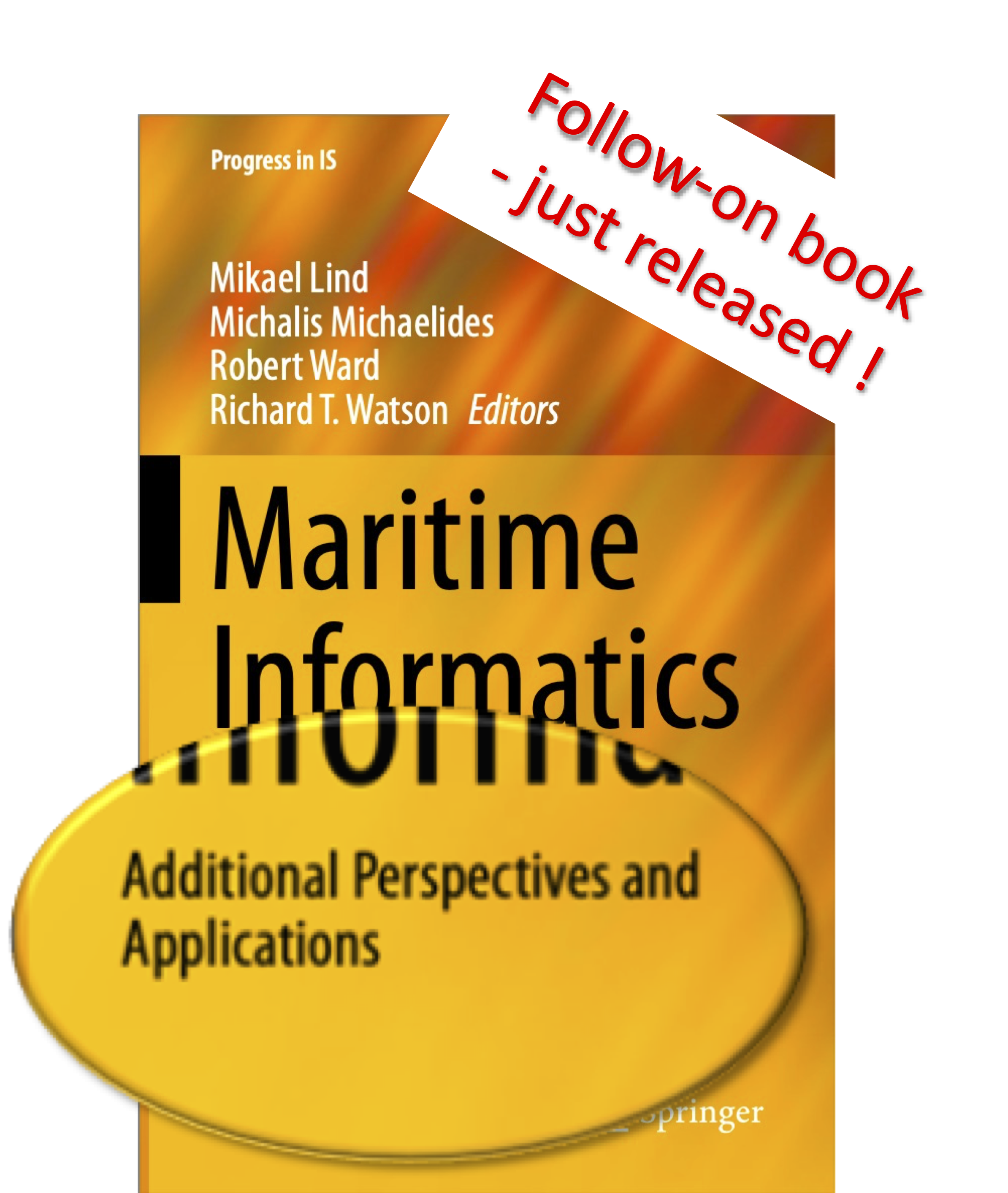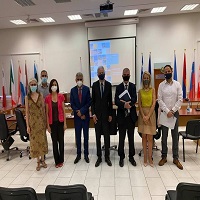Building upon the recently published inaugural book on Maritime Informatics, a complementary book has just been released by Springer entitled, “Maritime Informatics: Additional Perspectives and Applications,” also edited by Mikael Lind, Michalis Michaelides, Robert Ward, and Richard Watson.

The book can be reached at the following link: https://maritimeinformatics.org/2021/03/maritime-informatics-additional-perspectives-and-applications/.
This complementary book will address some of the most recent practical developments and experiences, particularly from a global perspective. In particular, the book examines the latest thinking on supply chains in support of global emergencies, recycling resources and the circular economy, ports acting as multidimensional hubs, the standardisation of data, and the emergence of data sharing platforms in the global container trade. The focus of the book is to address contemporary movements and to tackle global concerns, complementing in this way the original book on Maritime Informatics. The book's chapters are co-authored by 43 academics and leading practitioners in the shipping industry from 14 nations.
Maritime Informatics is originally defined as “the application of information systems to increase the efficiency, safety, and ecological sustainability of the world’s shipping industry”. Maritime informatics takes a holistic approach to shipping enabling higher levels of transparency, predictability, and visibility of all transport operations connected with shipping. Shipping industry covers the 90% of world seaborne trade movements all over the world. Collaboration within the industry starts with information sharing that leads to raise efficiency integrating operations and stretches to digital twinning to enhance operations.
Maritime informatics should be on the strategic decision-making agenda for all stakeholders in the shipping sector, because it embraces the full range of competencies needed to raise the capital productivity of the industry. In addition, it is an evolving science embracing a systems perspective that can be rapidly harnessed to address emergent problems because it can improve the quality of maritime decision-making, and thus increase the safety, ecological sustainability, agility and resilience of the world’s shipping industry. By doing so, it can boost the contribution of the maritime sector to the realization of several goals within the 17 Sustainable Development Goals (SDGs) of the United Nations’ 2030 Sustainable Development Agenda. For reading more about maritime informatics, readers can follow this link https://maritimeinformatics.org/.
As a part of shipping digitalization, the STEAM (Sea Traffic Management in the Eastern Mediterranean) project has a lot to offer for the effective management of maritime traffic in the Eastern Mediterranean, ensuring safety and environmental sustainability. STEAM is a three-year project that started in January 2019 with a budget of one million euros coordinated by the Cyprus University of Technology. The STEAM project members have embraced maritime informatics principles from the very start with the aim to develop the Port of Limassol as a world-class transshipment, information hub and a driver for short sea shipping in the Eastern Mediterranean.
For more information, please see https://steam.cut.ac.cy/ or contact: michalis.michaelides@cut.ac.cy
Michalis Michaelides, Assistant Professor, Department of Electrical and Computer Engineering and Informatics
Success for CUT’s Art+Design: elearning lab
Building upon the recently published inaugural book on Maritime Informatics, a complementary book has just been released by Springer entitled, “Maritime Informatics: Additional Perspectives and Applications,” also edited by Mikael Lind, Michalis Michaelides, Robert Ward, and Richard Watson.

The book can be reached at the following link: https://maritimeinformatics.org/2021/03/maritime-informatics-additional-perspectives-and-applications/.
This complementary book will address some of the most recent practical developments and experiences, particularly from a global perspective. In particular, the book examines the latest thinking on supply chains in support of global emergencies, recycling resources and the circular economy, ports acting as multidimensional hubs, the standardisation of data, and the emergence of data sharing platforms in the global container trade. The focus of the book is to address contemporary movements and to tackle global concerns, complementing in this way the original book on Maritime Informatics. The book's chapters are co-authored by 43 academics and leading practitioners in the shipping industry from 14 nations.
Maritime Informatics is originally defined as “the application of information systems to increase the efficiency, safety, and ecological sustainability of the world’s shipping industry”. Maritime informatics takes a holistic approach to shipping enabling higher levels of transparency, predictability, and visibility of all transport operations connected with shipping. Shipping industry covers the 90% of world seaborne trade movements all over the world. Collaboration within the industry starts with information sharing that leads to raise efficiency integrating operations and stretches to digital twinning to enhance operations.
Maritime informatics should be on the strategic decision-making agenda for all stakeholders in the shipping sector, because it embraces the full range of competencies needed to raise the capital productivity of the industry. In addition, it is an evolving science embracing a systems perspective that can be rapidly harnessed to address emergent problems because it can improve the quality of maritime decision-making, and thus increase the safety, ecological sustainability, agility and resilience of the world’s shipping industry. By doing so, it can boost the contribution of the maritime sector to the realization of several goals within the 17 Sustainable Development Goals (SDGs) of the United Nations’ 2030 Sustainable Development Agenda. For reading more about maritime informatics, readers can follow this link https://maritimeinformatics.org/.
As a part of shipping digitalization, the STEAM (Sea Traffic Management in the Eastern Mediterranean) project has a lot to offer for the effective management of maritime traffic in the Eastern Mediterranean, ensuring safety and environmental sustainability. STEAM is a three-year project that started in January 2019 with a budget of one million euros coordinated by the Cyprus University of Technology. The STEAM project members have embraced maritime informatics principles from the very start with the aim to develop the Port of Limassol as a world-class transshipment, information hub and a driver for short sea shipping in the Eastern Mediterranean.
For more information, please see https://steam.cut.ac.cy/ or contact: michalis.michaelides@cut.ac.cy
Michalis Michaelides, Assistant Professor, Department of Electrical and Computer Engineering and Informatics




